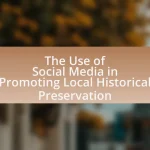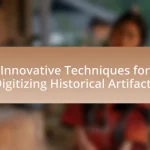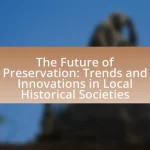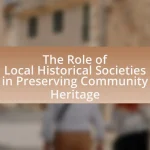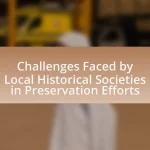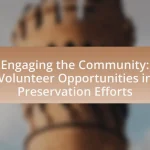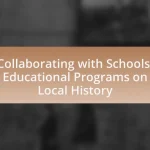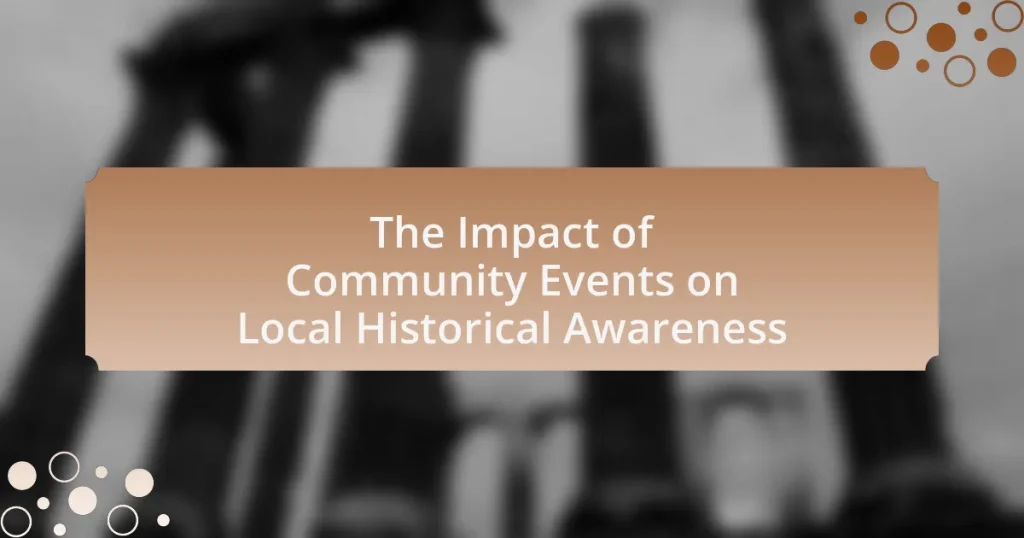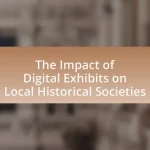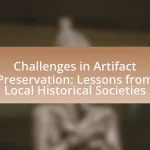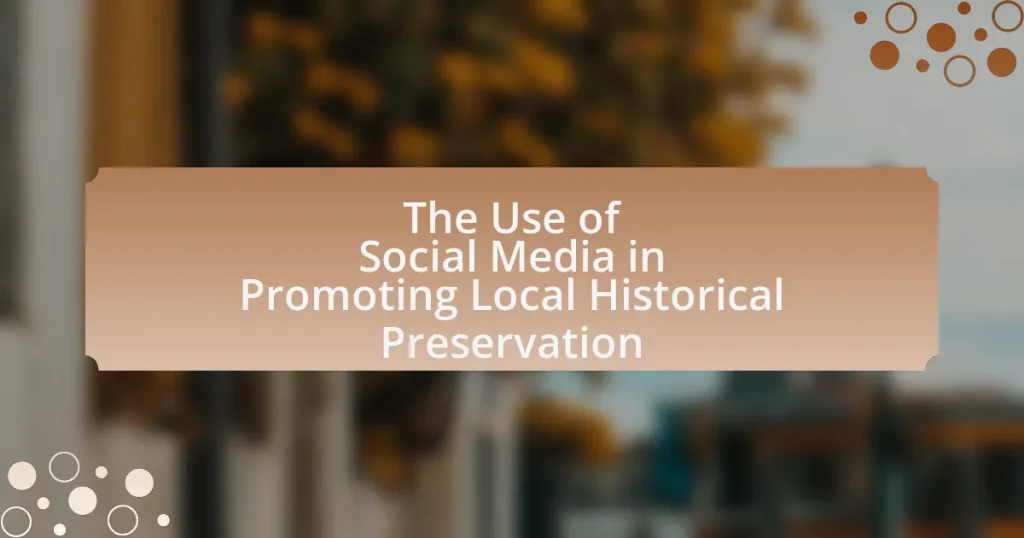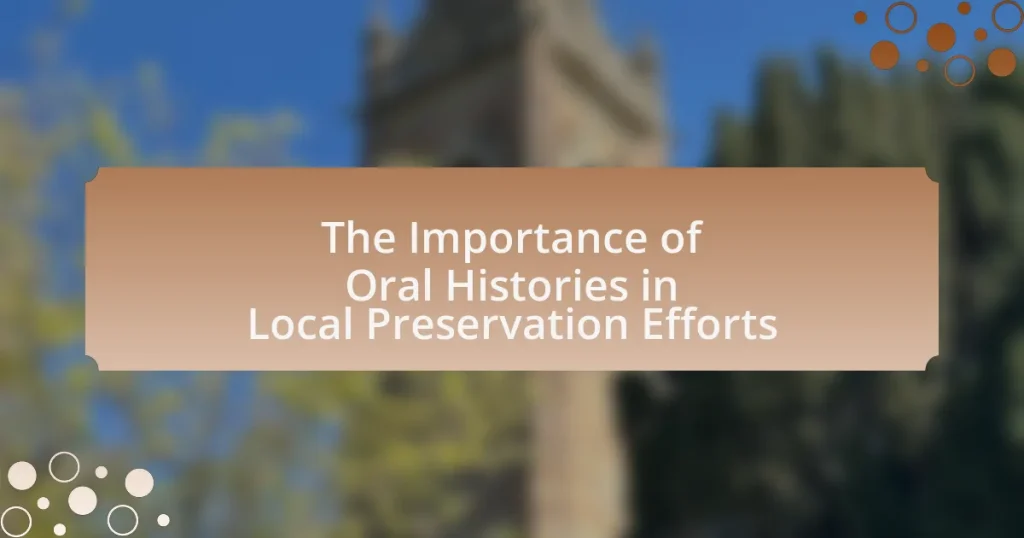The article examines the impact of community events on local historical awareness, highlighting how these gatherings enhance engagement and education among residents. It discusses various types of effective events, such as historical reenactments and local history fairs, which facilitate interactive learning and foster a deeper connection to community heritage. The article also addresses the importance of local historical awareness in shaping community identity and development, while identifying challenges such as funding and resource limitations that can hinder participation. Additionally, it explores strategies for designing inclusive events and integrating technology to promote historical understanding, along with successful examples that can serve as models for other communities.
What is the impact of community events on local historical awareness?
Community events significantly enhance local historical awareness by fostering engagement and education among residents. These events, such as historical reenactments, festivals, and educational workshops, provide opportunities for individuals to learn about their community’s heritage in an interactive manner. For instance, a study by the National Trust for Historic Preservation found that communities hosting regular historical events saw a 30% increase in local participation in history-related activities. This engagement not only deepens residents’ understanding of their local history but also strengthens community identity and pride.
How do community events contribute to the understanding of local history?
Community events enhance the understanding of local history by providing interactive platforms for residents to engage with their heritage. These events often feature historical reenactments, local storytelling, and exhibitions that showcase artifacts, which help to contextualize the past in a relatable manner. For instance, festivals celebrating local traditions or anniversaries of significant events allow participants to learn about their community’s history through firsthand experiences and shared narratives. Research indicates that such engagement fosters a deeper connection to local identity and promotes historical awareness, as evidenced by studies showing increased community participation in local history projects following events.
What types of community events are most effective in promoting historical awareness?
Community events that are most effective in promoting historical awareness include historical reenactments, local history fairs, and educational workshops. Historical reenactments engage participants and audiences by bringing past events to life, fostering a deeper understanding of historical contexts. Local history fairs provide a platform for sharing artifacts, stories, and research, allowing community members to connect with their heritage. Educational workshops, often led by historians or local experts, offer hands-on learning experiences that enhance knowledge about specific historical topics. Research indicates that interactive and participatory events significantly increase engagement and retention of historical information among attendees.
How do participants engage with local history during these events?
Participants engage with local history during these events through interactive activities such as guided tours, storytelling sessions, and workshops that highlight historical narratives. These activities allow participants to connect with their community’s heritage, fostering a deeper understanding of local events and figures. For instance, historical reenactments often take place, where participants can experience significant moments from the past, enhancing their appreciation for local history. Additionally, community discussions and exhibitions featuring artifacts or documents provide tangible connections to the past, further enriching participants’ engagement with their local history.
Why is local historical awareness important for communities?
Local historical awareness is important for communities because it fosters a sense of identity and belonging among residents. Understanding local history helps individuals connect with their community’s past, which can enhance civic pride and encourage participation in local events. For instance, studies show that communities with strong historical awareness often engage more actively in preservation efforts and cultural celebrations, leading to increased social cohesion and community resilience. This connection to history can also inform decision-making processes, ensuring that development respects and reflects the community’s heritage.
What role does historical awareness play in community identity?
Historical awareness is crucial in shaping community identity as it fosters a sense of belonging and continuity among members. By understanding their shared past, communities can create a collective narrative that reinforces social bonds and cultural values. For instance, studies show that communities that actively engage in preserving local history through events and education tend to exhibit stronger social cohesion and pride. This connection to history not only informs current community practices but also influences future generations, ensuring that the identity remains vibrant and relevant.
How can increased historical awareness influence community development?
Increased historical awareness can significantly influence community development by fostering a sense of identity and belonging among residents. When community members understand their shared history, they are more likely to engage in collaborative efforts to preserve cultural heritage, which can lead to revitalization projects and increased local pride. For instance, communities that celebrate their historical milestones through events often see enhanced social cohesion and participation in local governance, as evidenced by studies showing that towns with active historical societies report higher levels of civic engagement. This connection to history can also attract tourism, providing economic benefits that further support community initiatives and infrastructure improvements.
What challenges do community events face in promoting historical awareness?
Community events face several challenges in promoting historical awareness, primarily including limited funding, lack of engagement, and insufficient resources. Limited funding restricts the ability to organize comprehensive events that can effectively educate the public about local history. For instance, a study by the National Endowment for the Humanities found that 60% of community organizations reported financial constraints as a significant barrier to hosting educational programs.
Additionally, lack of engagement from the community can hinder participation and interest in historical events. Research indicates that when events do not resonate with the local population or fail to address their interests, attendance and involvement drop significantly.
Insufficient resources, such as access to knowledgeable speakers or educational materials, further complicates the ability to deliver impactful historical content. According to the American Alliance of Museums, many community organizations struggle to provide accurate and engaging historical narratives due to a lack of trained personnel. These challenges collectively impede the effectiveness of community events in fostering historical awareness.
How do funding and resources affect the success of these events?
Funding and resources significantly influence the success of community events aimed at enhancing local historical awareness. Adequate funding allows for better marketing, venue selection, and the hiring of knowledgeable speakers or facilitators, which directly impacts attendance and engagement levels. For instance, a study by the National Endowment for the Arts found that events with higher budgets attracted 30% more participants compared to those with limited financial support. Additionally, resources such as educational materials and technology can enhance the quality of the event, making it more informative and appealing to attendees. This correlation between funding, resource availability, and event success underscores the importance of financial investment in fostering community engagement with local history.
What barriers exist in engaging the community with local history?
Barriers to engaging the community with local history include lack of awareness, limited access to resources, and insufficient outreach efforts. Many community members may not recognize the significance of local history, leading to disinterest. Additionally, resources such as historical documents, artifacts, and educational programs may not be readily available or accessible, hindering participation. Furthermore, outreach efforts often fail to effectively communicate the value of local history, resulting in low engagement levels. These factors collectively contribute to a diminished connection between the community and its historical heritage.
How can community events be designed to enhance historical awareness?
Community events can be designed to enhance historical awareness by incorporating interactive elements that engage participants with local history. For instance, organizing guided historical tours that highlight significant landmarks and their stories can provide a tangible connection to the past. Additionally, workshops featuring local historians or storytellers can facilitate deeper understanding through personal narratives and firsthand accounts. Research indicates that experiential learning, such as reenactments or hands-on activities, significantly improves retention of historical knowledge, as evidenced by studies showing that participants in interactive history programs demonstrate higher recall of historical facts compared to traditional learning methods.
What strategies can organizers use to attract diverse participants?
Organizers can attract diverse participants by implementing inclusive outreach strategies that engage various community groups. These strategies include collaborating with local organizations that represent underrepresented populations, utilizing multilingual promotional materials to reach non-English speakers, and hosting events in accessible locations that cater to different mobility needs. Research indicates that events designed with cultural sensitivity and community input significantly increase participation rates among diverse groups, as seen in the findings from the National Endowment for the Arts, which highlight the importance of tailored programming in fostering inclusivity.
How can technology be integrated into community events to promote history?
Technology can be integrated into community events to promote history by utilizing interactive applications, augmented reality experiences, and digital storytelling platforms. These tools allow participants to engage with historical content in immersive ways, such as through mobile apps that provide historical context at specific locations or augmented reality features that bring historical figures and events to life in real-time. For instance, the use of QR codes at historical sites can link attendees to multimedia content, including videos and articles, enhancing their understanding of local history. Studies have shown that interactive technology increases engagement and retention of historical knowledge, making it a valuable asset in community events aimed at promoting historical awareness.
What are some successful examples of community events that increased historical awareness?
Successful examples of community events that increased historical awareness include local history fairs, reenactments, and heritage festivals. For instance, the annual “History Day” in various towns allows residents to showcase local artifacts and share stories, significantly enhancing community engagement with their history. Additionally, the “Civil War Reenactment” events attract large crowds, providing immersive experiences that educate participants about historical events and their significance. Heritage festivals, such as the “Smithsonian Folklife Festival,” celebrate cultural traditions and histories, fostering a deeper understanding of local heritage among attendees. These events have been shown to increase participation in local history initiatives and promote educational outreach, thereby solidifying their impact on historical awareness within communities.
What lessons can be learned from these successful events?
Successful events demonstrate the importance of community engagement in enhancing local historical awareness. These events foster a sense of belonging and pride among participants, which can lead to increased interest in local history. For instance, studies show that community festivals and historical reenactments significantly boost attendance at local museums and historical sites, indicating a direct correlation between such events and heightened historical awareness. Additionally, successful events often utilize storytelling and interactive experiences, which have been proven to enhance retention of historical knowledge among attendees.
How can these examples be replicated in other communities?
To replicate these examples in other communities, local organizations should initiate collaborative events that focus on historical education and engagement. By forming partnerships with schools, historical societies, and community leaders, these organizations can create programs that highlight local history through workshops, reenactments, and exhibitions. Evidence from successful community events, such as the “History Day” in various towns, shows that involving diverse community members increases participation and fosters a deeper understanding of local heritage. Additionally, utilizing social media and local media outlets for promotion can enhance visibility and attract a broader audience, as demonstrated by the increased attendance at events that effectively leveraged these platforms.
What best practices should organizers follow to maximize the impact of community events on historical awareness?
Organizers should prioritize community engagement and education to maximize the impact of events on historical awareness. Engaging local historians and educators can provide accurate and compelling narratives that resonate with attendees. Incorporating interactive elements, such as workshops or reenactments, fosters deeper connections to history, as evidenced by studies showing that experiential learning enhances retention of historical facts. Additionally, promoting events through diverse channels ensures broader participation, which research indicates increases community investment in local history. Finally, collecting feedback post-event allows organizers to refine future initiatives, ensuring they effectively address community interests and historical significance.

